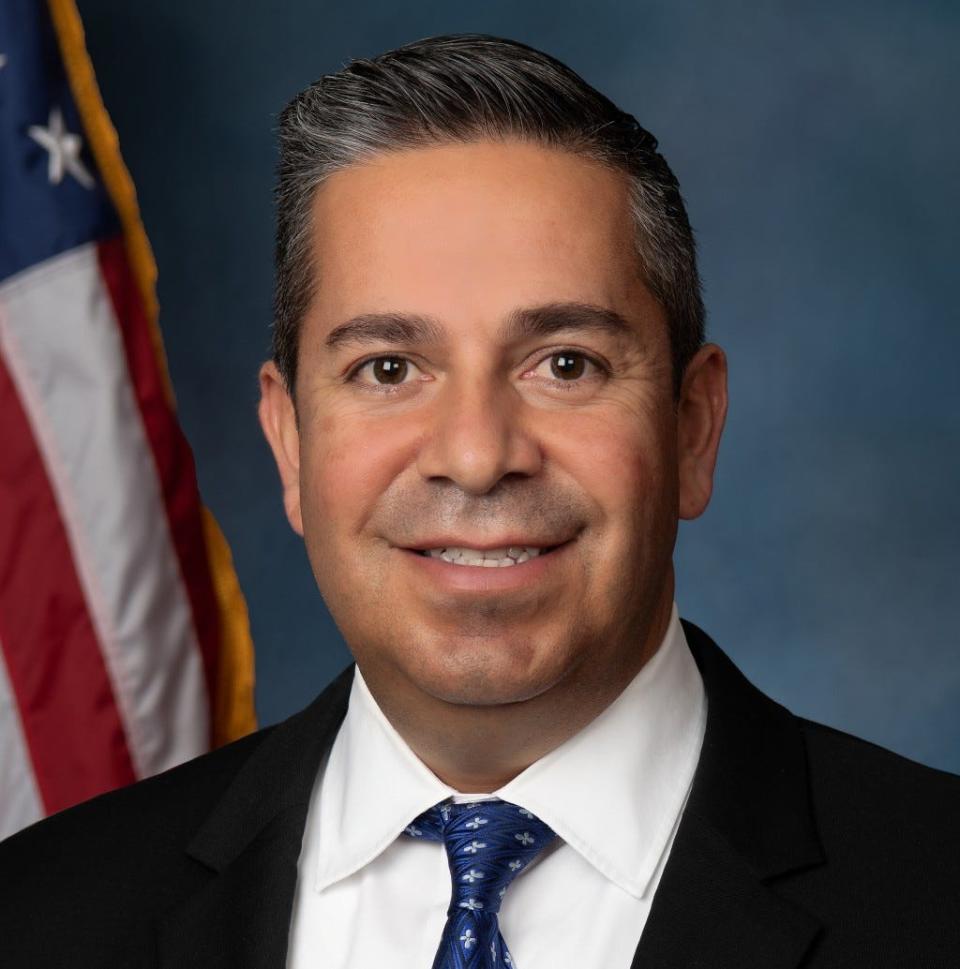What are New Mexico's Democrat U.S. senators pushing in Congress' climate change bill?
- Oops!Something went wrong.Please try again later.
- Oops!Something went wrong.Please try again later.
After the U.S. Senate passed the Inflation Reduction Act Sunday, New Mexico’s two U.S. senators touted environmental provisions in the sweeping climate change legislation they said would help reduce pollution and the nation’s reliance on fossil fuels.
The bill introduced by Democrat Senate leadership marked a reconciliation between Senate Leader Chuck Schumer (D-N.Y.) and Sen. Joe Manchin (D-W.Va.) who signaled his opposition to the Build Back Better Act – a signature piece of legislation pushed by President Joe Biden intended to reduce pollution across U.S. industries.
Schumer and Manchin announced the new bill last month, and it passed on party lines 51-50 with Vice President Kamala Harris serving as the tiebreaker.
More:Oil and gas' role in climate change highlighted in global report. How can New Mexico help?
Federal pollution controls could have an impact on New Mexico as its oil and gas industry, mostly in the state’s share of the nation-leading Permian Basin oil and gas fields, is mostly on federal land and the region was targeted by federal regulators for reductions in greenhouse gasses like methane believed to be a driver in climate change.
It was estimated the bill could reduce the industry’s methane emissions by 40 percent in the next decade.
U.S. Sen. Ben Ray Lujan (D-N.M.) pointed to $1.55 billion in federal funds included in the Act to cut methane emissions from the oil and gas sector, along with $27 billion for a federal “greenhouse gas reduction fund” known as a “green bank” that could push federal dollars to efforts curbing air pollution.
More:Oil and gas air pollution in Permian Basin draws concern from congressional committee

The Lujan-sponsored Coordinated Action to Capture Harmful (CATCH) Emissions Act was added to the bill as it passed the Senate, increasing tax credits to projects intended to improve the capture of carbon emissions from industrial sources like oil and gas extraction and power plants across the nation.
Another $5 billion would be spent, via the bill for pollution-reducing projects Lujan said would help local and Tribal governments devise their own specialized climate change plans.
Lujan also pushed, he said, for provisions in the bill to support renewable energy and the nation’s shift away from fossil fuels.
More:Oil and gas leases in New Mexico could be reversed after federal court ruling
This included $30 billion in grant and loan programs for state and utility companies working toward that transition, along with tax incentives for solar and wind installations including funding for low-income users.
The bill also would appropriate $5 billion for wildfire management in forests across the country, proposed in a year New Mexico saw its two biggest wildfires in the state’s history: the Calf Canyon Hermits Peak and Black fires – both burning more than 300,000 acres.
“This legislation will be the most transformative action that Congress has ever taken to tackle the climate crisis,” Lujan said upon the bill’s passage in the Senate. “Passing this bill is only the beginning—I will work hard, alongside my colleagues, and President Biden and his administration, to ensure these programs are successful, and that they align with New Mexico’s challenges and opportunities.”
More:How are New Mexico's wildfires being addressed in Congress' climate talks?
U.S. Sen. Martin Heinrich’s (D-N.M.) Zero Emission Homes Act was also included in the Inflation Reduction Act, he said, to add rebates for residents buying and installing electric appliance in their home to replace those that use fossil fuels like natural gas for power.
Heinrich said this would help reduce air pollution while also lowering energy costs for American homeowners.
“The clean energy and electrification investments that we secured in the Inflation Reduction Act represent by far the most significant steps that Congress has ever taken to spur the widespread deployment of highly-efficient, fully electric and climate pollution free technologies,” he said.
More:New Mexico leaders call on Biden to take climate action after Build Back Better Act stalls
Electrifying homes can also benefit public health, Heinrich said, as it could reduce gas emitted by home appliances and often unknowingly breathed in by residents.
“They can create major health benefits by replacing dirty fossil furnaces and gas stoves that are burning dangerous compounds into the indoor air in our homes,” he said. “That means less children with asthma and less seniors with breathing problems that many of us don’t even realize are being caused by the appliances in our homes.”
But despite its attempts to address pollution, New Mexico environmental groups were critical of the bill, arguing it did not go far enough in blocking future oil and gas extraction and pointing to vows from Biden during his 2020 President Election campaign to halt new oil and gas drilling on public land.
Language in the bill allowed for continued leases of public land to the industry, while also reinstating the results of recent offshore oil and gas lease sales previously struck down for environmental concerns.
“Fossil fuel barons will not be the harbingers of climate leadership,” said Rebecca Sobel with Santa Fe-based WildEarth Guardians. “New Mexicans and frontline communities across the world deserve better. Continued sacrifice of our land, air, and water cannot be done in the name of climate action.”
Adrian Hedden can be reached at 575-628-5516, achedden@currentargus.com or @AdrianHedden on Twitter.
This article originally appeared on Carlsbad Current-Argus: What are New Mexico senators pushing in Congress' climate change bill?

